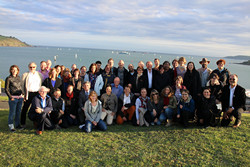SEA CHANGE and RESPONSEABLE join efforts to maximize impact for ocean literacy
Ocean literacy is defined as an understanding of the ocean’s influence on you and your influence on the ocean, and the Galway Statement on Atlantic Ocean commits the EU, Canada and the USA to promoting this understanding in order to improve citizens’ awareness of the value of the Atlantic. The SEA CHANGE and RESPONSEABLE projects, which were among a number of new Horizon 2020 projects presented at the last month’s conference The Atlantic – our Shared Resource: making the vision reality, will be working together in the coming years to make a significant contribution towards this ocean literacy objective. SEA CHANGE The SEA CHANGE project, which was presented by Jon Parr from the Marine Biological Association in the UK and Paula Keener from the National Oceanic and Atmospheric Administration (NOAA) in the US, aims to advance the concept of ocean literacy to engage citizens to take direct and sustainable action towards healthy seas. Over the next three years, the team will work to make a ‘sea change’ in the way that Europeans view the ocean. The idea is that citizens who have a real understanding of principles and concepts related to the ocean will be equipped to make informed decisions. Specifically, the project tasks will involve reviewing and compiling existing information related to this area and using social innovation to support a number of mobilisation actions connected to Life Long Learning and the Blue Schools Network. Indeed a number of relevant and influential networks – such as the European network of science centres and museums (Ecsite), the European Association of Geographers (EUROGEO) and United Nations Educational, Scientific and Cultural Organisation (UNESCO), and the European Marine Science Educators Asociation (EMSEA) – are partners on the project. The team is supported by a transatlantic advisory group and although SEA CHANGE has just recently kicked off, it has already held a number of meetings on transatlantic ocean literacy. Speaking at the conference, both Mr Parr and Ms Keener underlined the importance of this transatlantic dimension in the development of the project. Ms Keener pointed to the significant work on ocean literacy that NOAA has been engaged in since the signing of the Galway Statement and on NOAA’s complementary activities that will support the project as it moves forward. For example, European and US participants have already had the opportunity to learn together on deep sea discoveries onboard NOAA’s ship, The Okeanos Explorer. This type of shared learning is a natural extension of our shared heritage, passion, resources, knowledge and responsibility, according to Ms Keener. The SEA CHANGE International Advisory Group is meeting in Lisbon in June as part of the Blue Week and will be participating in a Transatlantic Ocean Literacy workshop. For further information, please visit: SEA CHANGE http://www.seachangeproject.eu/ RESPONSEABLE The team from the RESPONSEABLE (Sustainable Oceans: Our collective responsibility, our common interest) project will be addressing similar issues to SEA CHANGE from a different angle, as Dr. Olga Mashkina from ACTeon in France and Dr. Paul Snelgrove from Memorial University of Newfoundland in Canada explained at the conference. The 15 RESPONSEABLE project partners, representing very diverse range of interdisciplinary organisations and practitioners, will be working together with the overall aim of developing well-targeted and sound communication material that raises awareness on our (individual and collective) responsibility towards ocean and its ecosystems. This will involve critically assessing existing communication strategies, material and governance that focuses on the ocean as well as analysing the values, perceptions and understanding of the state, functioning and role of the ocean and the knowledge that exists on the ocean-human relationship. The aim is to contribute to changes in the behaviour of key stakeholders, so pressures on marine ecosystems are reduced and opportunities offered by the oceans are explored. This research will build towards an interactive and publicly accessible ocean knowledge system which can be used to develop and test innovative targeted communication materials including social media activities and serious games. It will also feed into the development of clear guidance for ocean literacy decision makers on the development of effective strategies. The RESPONSEABLE project is regionally focused, and will cover North and Atlantic, Black, Baltic and Mediterranean seas, mobilising regional stakeholders and building on existing initiatives. As with SEA CHANGE, the transatlantic element will be a cornerstone of the project. The team is supported by experts and decision makers in the US and Canada. Through partnerships with universities such as Memorial University of Newfoundland, the project will establish collaborations with existing networks in North America and will be able to disseminate results to a transatlantic audience. For further information, please visit: RESPONSEABLE http://www.responseable.eu/
Countries
France, United Kingdom



